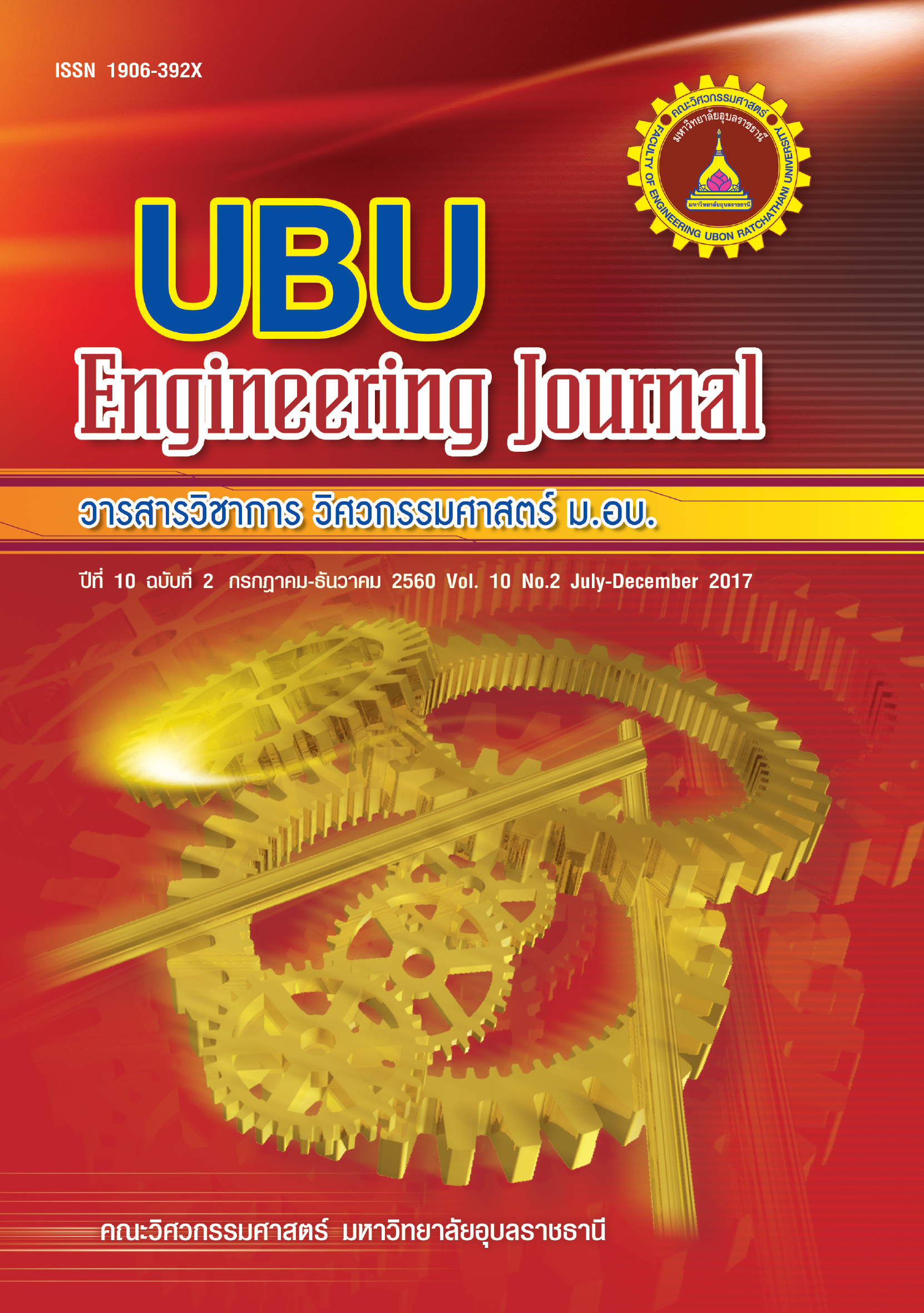วิธีพลังงานอิสระควบรวมสำหรับประมาณความหนืดไดนามิกส์ของน้ำมันพืชที่อุณหภูมิต่าง ๆ กับองค์ประกอบทางเคมี
Main Article Content
Abstract
Vegetable oil is an important and widely used lipid source for our everyday food products. Dynamics viscosity of vegetable oil is a very important factor to design an advanced technological process. In this work, proposed equation for predicting dynamics viscosities of vegetable oils at various temperatures to its chemical composition are correlated to the Martin’s rule of free energy additivity. Data available in literatures are used to validate and support the proposed equations. The proposed correlation is easy to use and the predicted dynamics viscosity values of vegetable oils at different temperatures agree well with the literature values. The estimated dynamics viscosity values of vegetable oils are in good agreement with those 144 data reported in the literature within a temperature range of 283.15–413.15 K, the average absolute deviation is 7.57%. The dynamics viscosity value outside of this temperature range may be possibly predicted by the correlation but the accuracy may be lower.
Article Details
References
[2] Andrade ENDC. The viscosity of liquids. Nature. 1930; 125(3148): 309–310.
[3] Azian MN, Mustafa Kamal AA, Panau F, Ten WK. Viscosity Estimation of Triacylglycerols and Some Vegetable Oils, Based on Their Triacylglycerol Composition. Journal of the American Oil Chemists' Society. 2001; 78(10): 1001–1005.
[4] Reid RC, Prausnitz JM, Poling BE. The Properties of Gases and Liquids. USA: McGraw-Hill; 1987.
[5] Dutt NVK, Prasad DHL. InterRelationships Among the Properties of Fatty Oils. Journal of the American Oil Chemists’ Society. 1989; 66(5): 701–703.
[6] Toro-Vazquez JF, Infante-Guerrero R. Regressional Models That Describe Oil Absolute Viscosity. Journal of the American Oil Chemists Society. 1993; 70(11): 1115–1119.
[7] Abramovic H, Klofutar C. The Temperature Dependence of Dynamic Viscosity for Some Vegetable Oil. Acta Chimica Slovenica. 1998; 45(1): 69–77.
[8] Halvorsen JD, Mammel WC, Clements LD. Density Estimation for Fatty Acids and Vegetable Oils Based on Their Fatty Acid Composition. Journal of the American Oil Chemists' Society. 1993; 70(9): 875–880.
[9] Martin AJP. Partition Chromatography. Annual Review of Biochemistry. 1950; 19(1): 517–542.
[10] Phankosol S, Chum-in T, Krisnangkura K. Estimating the Surface Tension of Vegetable Oils by Law of Free Energy Additivity. Naresuan University Journal: Science and Technology. 2016; 24(1): 82–90.
[11] Sansa-ard C, Aryusuk K, Lilitchan S, Krisnangkura K. Free Energy Contribution to Gas Chromatographic Separation of Petroselinate and Oleate Esters. Chromatography Research International. 2011: 9 pages.
[12] Esteban B, Riba J-R, Baquero G, Rius A, Puig R. Temperature Dependence of Density and Viscosity of Vegetable Oils. Biomass and Bioenergy. 2012; 42: 164–171.
[13] Quinchia LA, Delgado MA, Valencia C, Franco JM, Gallegos C. Viscosity Modification of Different Vegetable Oils with EVA Copolymer for Lubricant Applications. Industrial Crops and Products. 2010; 32(3): 607–612.
[14] Ceriani R, Paiva FR, Gonçalves CB, Batista E, Meirelles AJA. Densities and Viscosities of Vegetable Oils of Nutritional Value. Journal of Chemical & Engineering Data. 2008; 53(8): 1846–1853.
[15] Phankosol S, Sudaprasert K, Lilitchan S, Aryusuk K, Krisnangkura K. Estimation of Surface Tension of Fatty Acid Methyl Ester and Biodiesel at Different Temperatures. Fuel. 2014; 126: 162–168.
[16] Rodrigues CEC, Silva FA, Marsaioli A. Meirelles AJ A. Deacidification of Brazil Nut and Macadamia Nut Oils by Solvent Extraction: Liquid-Liquid Equilibrium Data at 298.2 K. Journal of Chemical & Engineering Data. 2005; 50(2): 517–523.
[17] Kim J, Kim DN, Lee SH, Yoo S-H, Lee S. Correlation of Fatty Acid Composition of Vegetable Oils with Rheological Behaviour and Oil Uptake. Food Chemistry. 2010; 118(2): 398–402.
[18] Igwe IO. The Effects of Temperature on the Viscosity of Vegetable Oils in Solution. Industrial Crops and Products. 2004; 19(2): 185–190.

